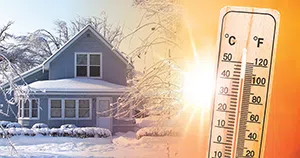We watch it on TV, we check it compulsively on our computers and smart phones, and we bring it up robotically in small talk. As a society, we pay close attention to weather, with a fervor usually reserved for organized religion.
We tend to see weather as both an annoying hindrance and as a gift. Weather is a strange entity that can interrupt our best-laid vacation plans or encourage a spur of the moment backyard barbecue.
Weather affects the sale of goods and services both consciously and unconsciously. Bad weather keeps people at home. In particular, rain, snow and extreme temperatures have been identified as factors that can make going out to shop less attractive and, thereby, negatively affect retail sales and store traffic.
Weather influences both sales volume and store traffic in particular product categories. For example, when temperatures fall, ice cream sales decrease, while sales of oatmeal porridge increase. Similarly, people tend to purchase more clothing and footwear in the winter and more food and drinks in the summer.
Retailers themselves are aware of such effects and use weather as a cue to begin and end merchandising seasons – gardening supplies begin to appear on store shelves with the arrival of spring weather, while the sale of snow shovels coincides with the onset of winter. In general, these studies point out that many products are better suited to, or even designed for, particular types of weather.
Not surprisingly, and as HVAC industry experts will agree, demand for air conditioners is closely correlated to rising springtime temperatures. Oppressively hot days also trigger spikes in demand, as uncomfortable consumers seek out air conditioners to stay cool in the summer heat.
WeatherLift, a company that helps weather-sensitive advertisers play and deploy marketing campaigns, studied online demand for air conditioners in five major U.S. cities (New York, Boston, Chicago, Los Angeles, and Miami) from May 1st, 2011 to July 31st, 2011. In their study, keyword search volume (provided by Google) was used as a proxy for general market demand.
They discovered a strong correlation (r=0.73) between temperature and online demand for air conditioners. Los Angeles and Chicago are correlated very strongly, at 0.72 and 0.74, respectively. When all geographies were examined together, they found that demand rises 114% above average on the hottest ten percent of days.
The full study can be found here.




